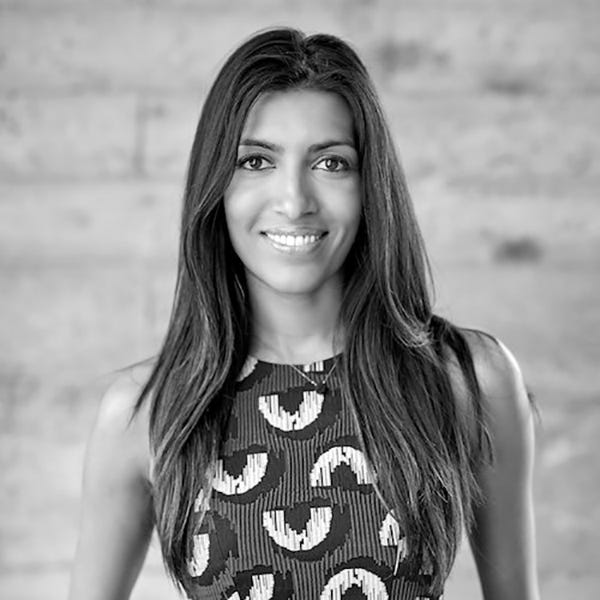2018
From New York to Mumbai: How I became a social entrepreneur
Leila Janah's curiosity led her to a trip that would sow the seeds of her career as a social entrepreneur.
By Leila Janah – Founder and CEO, Samasource and LXMI
My parents emigrated from Bombay to Buffalo, New York, in 1978. When as children, my brother and I didn’t finish our plates, my mother used to share an anecdote with us – one time in Kolkata, she threw a piece of bread onto her street for the local stray dog, and a street kid rushed over, pushed the animal away, and gobbled it up.
That story often made me wonder, why was I so lucky when there were so many children in the world who were not?
My curiosity and quest for answers led me to a trip abroad that would sow the seeds of my career as a social entrepreneur.
Three months after my seventeenth birthday, I left suburban Los Angeles and moved to Apirede, a village in the southern part of rural Ghana.
As a young woman, I was often curious by the root causes of poverty and ways in which people escaped it. Despite my involvement with poor and marginalized communities in California, having seen my parents work their way out of poverty with hard work, I had internalized the myth that poor people are in their predicament because they were not willing to work hard enough or had not developed the right personal or family values.
Two months into my Ghana trip, a young boy named Femi Abass shattered this way of thinking. Femi was a ten-year-old student whose eyes had acquired a milky-white coating in early childhood from a preventable condition his mother could not afford to treat.
He’d stay after school almost every day and loved to talk about the books he was reading, especially Nigerian author Chinua Achebe’s Things Fall Apart.
Femi had the kind of raw talent that can evolve into genius under the right mentors. He would have smoked me in fourth grade had he not been born to a single mother in a country where the average daily income was equivalent to two American dollars in 2005.
It was not hard to see then, that I had landed in America and he’d landed in Apirede by an accident of birth, and that our fates were, statistically speaking, tied strongly to this accident. The disparity made me sick.
Eventually, my time in Ghana came to an end and a few years later, I was a Harvard graduate who had just taken a consulting job in New York City.
As luck would have it, my first project sent me to India to help take an outsourcing company public.
Their call center in Mumbai was housed in a modern building where young people – some of whom from slum dwellers – answered phones and handled customer service transactions for airlines and credit card companies from the hundreds of three-sided cubicles.
At the time, I was reading a book about globalization by Thomas Friedman called The World Is Flat that heavily featured this industry. He asserts that the rise in cheap access to connectivity and hardware in developing countries was flattening the global playing field, making it possible for them to compete for the knowledge and work that had previously been the exclusive domain of a few wealthy countries, namely, the United States.
Although I knew this already, Friedman made it click for me. Millions of educated young people in the developing world now spoke English and could do work via computers. The biggest barrier to economic development is the fact that masses of people are constrained by geography, and yet capital can move freely across borders. Digital work frees workers to find jobs in the richest countries, even if they can’t ever physically leave their slum.
Access to internet has permitted young, literate poor people – like Femi Abass in Ghana or the slum dwellers of Dharavi – to take digital jobs for large companies abroad.
With this realization in mind, I returned to New York and to my management consultant job, but I started working nights and weekends researching and developing my idea for a start-up that would hire only people like Femi and the Indian slum dwellers. Outsourcing was a billion-dollar industry, and I was going to find a way for the poor to get a piece of it.
Samasource was created a few months later, in 2008, to lift people out of poverty by connecting them to dignified digital work. Since then, it has impacted 37,000+ people.
Looking back at my journey, thinking about that Kolkata street kid who gobbled leftover bread, my friend Femi in Apirede and the street-dwellers in the outsourcing center in Mumbai, I am reminded on why I became a social entrepreneur. The company I created attempts to give work to the millions of people who are educated but lack access to real, thriving opportunities. Samasource was born out of my conviction that giving work means giving the opportunity to rise and ultimately, respond to our duty to leave society better than we first found it.

ABOUT THE AUTHOR :
LEILA JANAH
Leila Janah is the Founder and CEO of Samasource and LXMI, two companies that go beyond charity to #givework to low-income people around the world using cutting-edge social enterprise models in technology and luxury skincare, respectively. She is the author of the book Give Work (Penguin/RandomHouse), which was released in September 2017. Follow her on LinkedIn, Facebook, Twitter and Instagram.